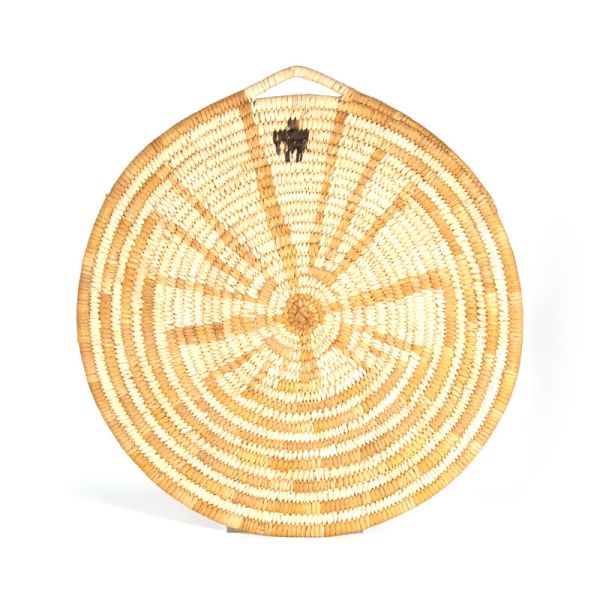LARGE FLAT MAZE PLAQUE BASKET BY AN ARTIST ONCE KNOWN (TOHONO O’ODHAM )
$650.00
SKU
631204596
LARGE FLAT MAZE PLAQUE BASKET BY AN ARTIST ONCE KNOWN (TOHONO O’ODHAM )
Tohono O'odham baskets are hand crafted of beargrass, yucca (white or green) and devils claw (black). The technique used is known as coiling. Split stitch baskets are made of beargrass and sewn with yucca in such a manner that the coil is exposed to form part of the pattern.
The Tohono O'odham, which means "Desert People", were formerly known as the Papago by the Spanish and are descendants of the Hohokam culture, which flourished between 200- 1450 AD in what is now southern and central Arizona. They originated the use of horsehair in making miniature baskets sometime in the 1960's.
The Man in the Maze symbol is an ancient Native American emblem that can be traced back to ancient petroglyphs in the American Southwest. It is closely associated with beliefs of the Tohono O'odham and Pima nations, who frequently use the symbol in their artwork (although other tribes of the Southwest also use it). It is a generally thought of as a visual representation of the cycle of life. The figure represents a man or mankind, and the maze represents the path of life and the experiences and choices we make, acquiring knowledge and understanding as we go. The center alternately represents the achievement of one's goals or the point at which our physical lives end, and we pass on to eternal life.
Measurements: 18 1/2" long x 17 1/2" wide
This is a consignment item and is not eligible for layaway.
Tohono O'odham baskets are hand crafted of beargrass, yucca (white or green) and devils claw (black). The technique used is known as coiling. Split stitch baskets are made of beargrass and sewn with yucca in such a manner that the coil is exposed to form part of the pattern.
The Tohono O'odham, which means "Desert People", were formerly known as the Papago by the Spanish and are descendants of the Hohokam culture, which flourished between 200- 1450 AD in what is now southern and central Arizona. They originated the use of horsehair in making miniature baskets sometime in the 1960's.
The Man in the Maze symbol is an ancient Native American emblem that can be traced back to ancient petroglyphs in the American Southwest. It is closely associated with beliefs of the Tohono O'odham and Pima nations, who frequently use the symbol in their artwork (although other tribes of the Southwest also use it). It is a generally thought of as a visual representation of the cycle of life. The figure represents a man or mankind, and the maze represents the path of life and the experiences and choices we make, acquiring knowledge and understanding as we go. The center alternately represents the achievement of one's goals or the point at which our physical lives end, and we pass on to eternal life.
Measurements: 18 1/2" long x 17 1/2" wide
This is a consignment item and is not eligible for layaway.



